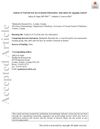 131 citations,
September 2010 in “The Laryngoscope”
131 citations,
September 2010 in “The Laryngoscope” Forehead modification greatly increases the perception of femininity and is a safe procedure.
 69 citations,
December 2011 in “Journal of Ethnopharmacology”
69 citations,
December 2011 in “Journal of Ethnopharmacology” Some Thai plants, especially Carthamus tinctorius, could help prevent hair loss and promote hair growth without adverse effects.
 49 citations,
May 2013 in “JAMA Dermatology”
49 citations,
May 2013 in “JAMA Dermatology” Hair loss links to higher death risk from diabetes and heart disease; not a direct cause, but a marker for risk factors.
 43 citations,
July 1994 in “Archives of Dermatology”
43 citations,
July 1994 in “Archives of Dermatology” People with androgenetic alopecia have more personality disorders and mental health symptoms; treatment may help.
 37 citations,
July 2010 in “International Journal of Trichology”
37 citations,
July 2010 in “International Journal of Trichology” Hair loss affects quality of life, self-esteem, and confidence, but younger patients cope better.
 29 citations,
September 2012 in “Dermatologic Clinics”
29 citations,
September 2012 in “Dermatologic Clinics” Hair disorders are caused by a complex mix of biology, genetics, hormones, and environmental factors, affecting hair growth and leading to conditions like alopecia.
 21 citations,
February 2016 in “Reproductive Biomedicine Online”
21 citations,
February 2016 in “Reproductive Biomedicine Online” The conclusion suggests that PCOS may persist due to genetic traits that, while harmful for female fertility, could have provided survival and reproductive benefits to males.
 21 citations,
November 2010 in “Talanta”
21 citations,
November 2010 in “Talanta” Researchers developed a reliable method to measure testosterone and epitestosterone in urine for medical and anti-doping use.
 17 citations,
February 2018 in “British Journal of Oral & Maxillofacial Surgery”
17 citations,
February 2018 in “British Journal of Oral & Maxillofacial Surgery” Forehead reduction and orbital contouring are important for satisfactory facial feminization in transgender females, with high satisfaction and low long-term problems.
 15 citations,
November 2017 in “Drug Delivery and Translational Research”
15 citations,
November 2017 in “Drug Delivery and Translational Research” Certain extracts from Curcuma aeruginosa Roxb. and germacrone can boost the skin's absorption of minoxidil, a hair growth promoter, making it more effective.
 10 citations,
May 2020 in “Dermatology Research and Practice”
10 citations,
May 2020 in “Dermatology Research and Practice” Proteoglycans are important for hair growth, and a specific treatment can help reduce hair loss.
 10 citations,
June 2016 in “Wound Repair and Regeneration”
10 citations,
June 2016 in “Wound Repair and Regeneration” The microenvironment, especially mechanical forces, plays a crucial role in hair growth and could lead to new treatments for hair loss.
 9 citations,
July 2011 in “The Journal of Sexual Medicine”
9 citations,
July 2011 in “The Journal of Sexual Medicine” Hair loss drugs like finasteride may cause lasting sexual and mood side effects, and more research is needed to understand these risks.
 5 citations,
August 2020 in “Dermatologic Therapy”
5 citations,
August 2020 in “Dermatologic Therapy” Most YouTube hair loss treatment videos are popular but often biased and lack reliable sources.
 2 citations,
June 2022 in “International Journal of Biomedicine”
2 citations,
June 2022 in “International Journal of Biomedicine” The review suggests a comprehensive approach to treat hirsutism, focusing on hair removal, medication, and managing emotional effects.
 2 citations,
August 2020 in “Cosmetics”
2 citations,
August 2020 in “Cosmetics” Herbal formula shows promise for hair loss treatment.
 1 citations,
January 2002 in “Health care on the Internet”
1 citations,
January 2002 in “Health care on the Internet” The article says Rogaine and Propecia can treat hair loss, warns about unreliable internet info, and advises talking to a doctor before using hair loss products.
 June 2024 in “Research Square (Research Square)”
June 2024 in “Research Square (Research Square)” Finasteride overdose can cause acute pancreatitis.
 April 2018 in “Routledge eBooks”
April 2018 in “Routledge eBooks” Gender identity can be more diverse than just male or female.
 August 2014 in “Annals of Plastic Surgery”
August 2014 in “Annals of Plastic Surgery” The book is a detailed guide on hair restoration, useful for both new and experienced surgeons.
 January 2017 in “Journal of cosmetology & trichology”
January 2017 in “Journal of cosmetology & trichology” Hair loss can cause anxiety and depression, especially in young, single women, and early psychological support is important.
 May 2013 in “Journal of the Egyptian Women's Dermatologic Society (Print)”
May 2013 in “Journal of the Egyptian Women's Dermatologic Society (Print)” High aldosterone and free testosterone levels link to female hair loss; testing aldosterone may predict hypertension risk.
 80 citations,
April 2018 in “Trends in Molecular Medicine”
80 citations,
April 2018 in “Trends in Molecular Medicine” Lichen Planopilaris and Frontal Fibrosing Alopecia may help us understand hair follicle stem cell disorders and suggest new treatments.
 26 citations,
May 2012 in “Cellular and Molecular Life Sciences”
26 citations,
May 2012 in “Cellular and Molecular Life Sciences” NcoA4 may have roles beyond helping control gene activity, possibly affecting cell behavior and stability.
 21 citations,
October 2009 in “Biochemical Engineering Journal”
21 citations,
October 2009 in “Biochemical Engineering Journal” Stem cell therapy is a promising approach for hair regrowth despite potential side effects.
 20 citations,
August 2019 in “Expert Opinion on Drug Safety”
20 citations,
August 2019 in “Expert Opinion on Drug Safety” Some medications for bladder problems can cause memory issues or mood changes, and doctors should monitor these side effects.
 15 citations,
March 1998 in “Journal of Public Policy & Marketing”
15 citations,
March 1998 in “Journal of Public Policy & Marketing” The paper concludes that drug labels should be clear for all, especially for those with low literacy, and suggests aiming for high comprehension test passing rates with diverse test populations.
 14 citations,
April 2021 in “Biology”
14 citations,
April 2021 in “Biology” Thai rice bran extracts, especially from Tubtim Chumphae rice, can significantly reduce the activity of hair loss genes, with x-tocopherol showing potential as an anti-hair loss product.
 12 citations,
January 2018 in “Journal of Drug Delivery Science and Technology”
12 citations,
January 2018 in “Journal of Drug Delivery Science and Technology” The new particle system could be a promising treatment for diseases related to the 5-α reductase enzyme.
 12 citations,
January 2016 in “Endocrinology, diabetes & metabolism case reports”
12 citations,
January 2016 in “Endocrinology, diabetes & metabolism case reports” Testosterone therapy improved physical and social health in a male with 49,XXXXY syndrome.






























